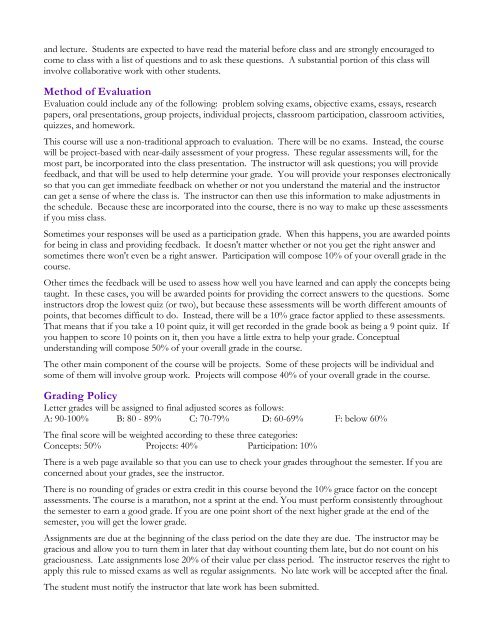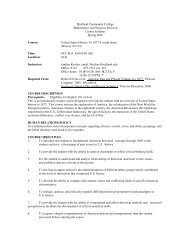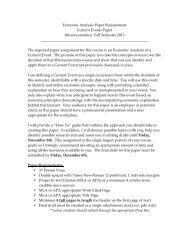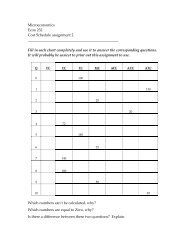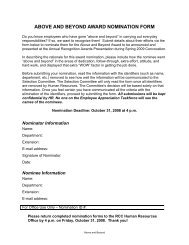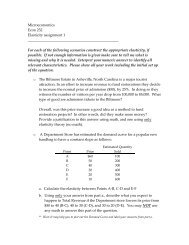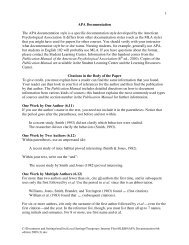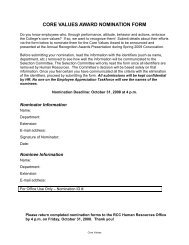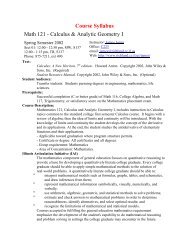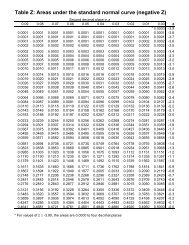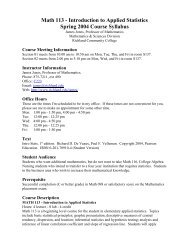Math 113 â Introduction to Applied Statistics Spring 2012 Course ...
Math 113 â Introduction to Applied Statistics Spring 2012 Course ...
Math 113 â Introduction to Applied Statistics Spring 2012 Course ...
You also want an ePaper? Increase the reach of your titles
YUMPU automatically turns print PDFs into web optimized ePapers that Google loves.
and lecture. Students are expected <strong>to</strong> have read the material before class and are strongly encouraged <strong>to</strong>come <strong>to</strong> class with a list of questions and <strong>to</strong> ask these questions. A substantial portion of this class willinvolve collaborative work with other students.Method of EvaluationEvaluation could include any of the following: problem solving exams, objective exams, essays, researchpapers, oral presentations, group projects, individual projects, classroom participation, classroom activities,quizzes, and homework.This course will use a non-traditional approach <strong>to</strong> evaluation. There will be no exams. Instead, the coursewill be project-based with near-daily assessment of your progress. These regular assessments will, for themost part, be incorporated in<strong>to</strong> the class presentation. The instruc<strong>to</strong>r will ask questions; you will providefeedback, and that will be used <strong>to</strong> help determine your grade. You will provide your responses electronicallyso that you can get immediate feedback on whether or not you understand the material and the instruc<strong>to</strong>rcan get a sense of where the class is. The instruc<strong>to</strong>r can then use this information <strong>to</strong> make adjustments inthe schedule. Because these are incorporated in<strong>to</strong> the course, there is no way <strong>to</strong> make up these assessmentsif you miss class.Sometimes your responses will be used as a participation grade. When this happens, you are awarded pointsfor being in class and providing feedback. It doesn't matter whether or not you get the right answer andsometimes there won't even be a right answer. Participation will compose 10% of your overall grade in thecourse.Other times the feedback will be used <strong>to</strong> assess how well you have learned and can apply the concepts beingtaught. In these cases, you will be awarded points for providing the correct answers <strong>to</strong> the questions. Someinstruc<strong>to</strong>rs drop the lowest quiz (or two), but because these assessments will be worth different amounts ofpoints, that becomes difficult <strong>to</strong> do. Instead, there will be a 10% grace fac<strong>to</strong>r applied <strong>to</strong> these assessments.That means that if you take a 10 point quiz, it will get recorded in the grade book as being a 9 point quiz. Ifyou happen <strong>to</strong> score 10 points on it, then you have a little extra <strong>to</strong> help your grade. Conceptualunderstanding will compose 50% of your overall grade in the course.The other main component of the course will be projects. Some of these projects will be individual andsome of them will involve group work. Projects will compose 40% of your overall grade in the course.Grading PolicyLetter grades will be assigned <strong>to</strong> final adjusted scores as follows:A: 90-100% B: 80 - 89% C: 70-79% D: 60-69% F: below 60%The final score will be weighted according <strong>to</strong> these three categories:Concepts: 50% Projects: 40% Participation: 10%There is a web page available so that you can use <strong>to</strong> check your grades throughout the semester. If you areconcerned about your grades, see the instruc<strong>to</strong>r.There is no rounding of grades or extra credit in this course beyond the 10% grace fac<strong>to</strong>r on the conceptassessments. The course is a marathon, not a sprint at the end. You must perform consistently throughoutthe semester <strong>to</strong> earn a good grade. If you are one point short of the next higher grade at the end of thesemester, you will get the lower grade.Assignments are due at the beginning of the class period on the date they are due. The instruc<strong>to</strong>r may begracious and allow you <strong>to</strong> turn them in later that day without counting them late, but do not count on hisgraciousness. Late assignments lose 20% of their value per class period. The instruc<strong>to</strong>r reserves the right <strong>to</strong>apply this rule <strong>to</strong> missed exams as well as regular assignments. No late work will be accepted after the final.The student must notify the instruc<strong>to</strong>r that late work has been submitted.


